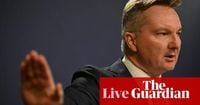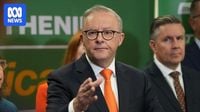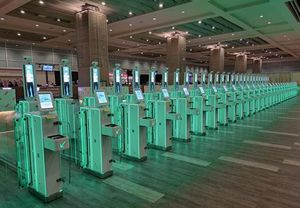As Australia gears up for a pivotal federal election on May 3, 2025, Prime Minister Anthony Albanese has taken a firm stance against looming U.S. tariffs, declaring that Australia will not compromise on key issues that the United States views as trade barriers. The U.S. Trade Report has highlighted Australia’s pharmaceutical laws, biosecurity regulations, and media laws as significant impediments to American trade interests, prompting a toughened response from the Albanese government.
In a statement made on April 1, Albanese emphasized that these laws are not negotiable, saying, "Those issues are not up for negotiation. Not on my watch. We will negotiate sensibly but we won't undermine the biosecurity system." This declaration comes just a day before U.S. President Donald Trump is set to announce a new round of tariffs, which he has dubbed "liberation day." The report from the U.S. trade office underscores the ongoing tensions between the two nations regarding trade practices.
The U.S. has expressed particular concern over Australia’s stringent biosecurity laws, which the report claims restrict access to American beef, pork, poultry, apples, and pears. The Australian government maintains these regulations are essential for protecting its native wildlife from foreign diseases. For instance, U.S. apples and pears are banned due to fears of pests such as the bacterial disease fire blight, which the U.S. trade report disputes.
Moreover, the U.S. pharmaceutical industry has long opposed Australia’s pricing and access regulations, which they argue hinder their market potential. The report also criticizes the News Media Bargaining Code, enacted under the previous Morrison government, which mandates social media companies to compensate news organizations for content shared on their platforms. Opposition Leader Peter Dutton has echoed Albanese's sentiments, stating, "I will stand up for our country's interests every day if I am given the great honour of being prime minister. I will not compromise on any of that for our country."
As the government continues to negotiate with the U.S. for exemptions from these tariffs, the argument that Australia imports more than it exports to the U.S. is being employed. However, past experiences, such as the failure to secure exemptions from tariffs on steel and aluminum, have left officials cautious about the effectiveness of this argument.
In the backdrop of these trade discussions, the upcoming federal election presents a critical opportunity for Australians to voice their opinions on a range of pressing issues, including human rights. Amnesty International has called on voters to prioritize human rights in their electoral choices, highlighting the need for a national Human Rights Act and better support for refugees and First Nations children.
Amnesty’s campaign emphasizes that elections are a chance to shape the future of Australia, urging citizens to consider what kind of country they want to live in. The organization is advocating for policies that address the rights of marginalized groups, including refugees and Indigenous Australians, who continue to face systemic challenges.
As the election date approaches, Australians are encouraged to familiarize themselves with the voting process. The Australian Electoral Commission has outlined that enrollment is compulsory for citizens aged 18 and over, with the close of rolls set for April 7, 2025. Voters can expect to participate in a preferential voting system, where they rank candidates in order of preference for both the House of Representatives and the Senate.
In the House of Representatives, voters will elect members to represent their electorates, while the Senate will see the election of 76 senators—12 from each state and 2 from each territory. Senators serve six-year terms, contrasting with the three-year terms of House members. The upcoming election will also see a focus on local issues, with candidates expected to address the needs of their communities.
In a recent media conference, Climate Change and Energy Minister Chris Bowen defended the government’s position on hosting the upcoming Cop31 climate conference, dismissing claims from Dutton that it would cost taxpayers billions. Bowen asserted that hosting the conference presents a unique opportunity for Australia to showcase its renewable energy capabilities, which could yield significant economic benefits.
Bowen stated, "Hosting the conference would be a great opportunity to sell Australia’s renewable energy resources as a renewable energy superpower. It’s the world’s largest trade fair. Report after report has shown that it’s got huge economic payoffs for the country that hosts it. We see this as in our national interest." This event is expected to draw international attention to Australia’s approach to climate change and sustainability.
As the political landscape evolves, the Labor Party has been keen to differentiate itself from the Coalition, with ministers like Katy Gallagher drawing comparisons between Dutton and former U.S. President Donald Trump. Gallagher criticized Dutton’s proposed policies as being out of touch with Australian values, stating, "We have Peter Dutton who is wanting to put everybody’s taxes up, ban work from home... and then today, coming out and saying he wants to cut Medicare."
With the election just weeks away, the stakes are high for both major parties as they navigate these complex issues. Voter turnout is expected to be significant, as Australians recognize the importance of their voices in shaping the policies that govern their lives.
In addition to the broader political discourse, local issues remain at the forefront of the election campaign. Albanese has made campaign stops in key electorates, such as Corangamite, where he pledged $5.45 million for upgrades to community sports facilities. Such investments are seen as essential for fostering community spirit and engagement, especially in the lead-up to the election.
As the political landscape continues to unfold, Australians are reminded of the importance of being informed and active participants in their democracy. The decisions made in the upcoming election will have lasting implications for the nation’s direction, particularly in areas such as trade, human rights, and climate policy.






